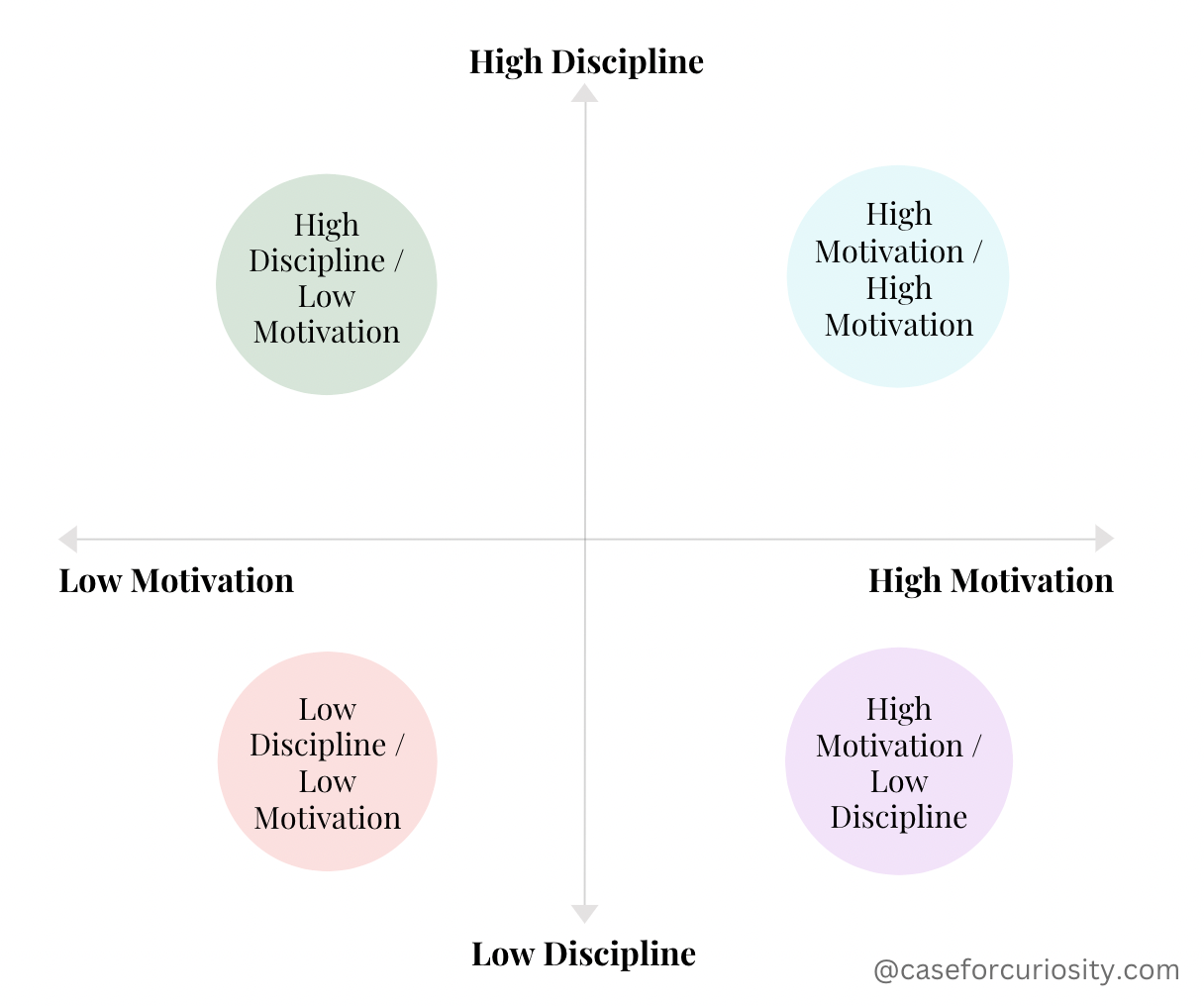Two Essential Ingredients for Success: Motivation vs. Discipline
What do you want the most, and what would it take to achieve it?
If this sounds like a big question, it’s because it is.
Asking it can help you craft a vision for the life you truly want. Failing to ask it is at the heart of the most common regret of the dying: “I wish I’d had the courage to live a life true to myself, not the life others expected of me.”
Asking it, however, isn’t enough. Once we identify what we truly want, we need to take action to make it happen.
Motivation and discipline are two key ingredients that enable us to achieve our goals. Applied over time, they allow us to build the lives we aspire to.
What is the difference between motivation and discipline? Where do they come from and how can we deepen each of them? And, when it comes to motivation vs. discipline, which one is more important?
In this post, I’ll define motivation and discipline, take a look at the connection between them, and their impact on our ability to achieve our goals.
Overview
Motivation
Motivation is what moves us to act. It can come from within, like a mental state, or from outside ourselves, like a paycheck. When we’re motivated, we have a strong incentive to take action.
Motivation is often used interchangeably with desire, but the two are distinct. Desire means you strongly want something. Motivation means you are inclined to act.

For example, a desire (e.g. more money) can be a motivation (e.g. why you do your job), but a motivation cannot be a desire. Desire is just one possible motivation for any given behavior. Other examples are loyalty, obligation, love, and fear.
Two types of motivation
There are two types of motivation: intrinsic and extrinsic.
Intrinsic Motivation
Intrinsic motivation comes from within. When we are driven by internal rewards, like doing something because we enjoy it, we are responding to intrinsic motivation Research has found that intrinsic motivation tends to be “more long-lasting, self-sustaining, and satisfying than extrinsic motivation.”
Extrinsic Motivation
When we act for the sake of external rewards, such as prizes, money, recognition, and approval, we’re responding to extrinsic motivation.

Unlike intrinsic motivation, extrinsic motivation is conditional on someone or something else. This means that if an extrinsic reward stops, our behavior may stop unless it has become a habit. It is therefore less reliable.
Intrinsic + extrinsic motivation
A person can be motivated by both intrinsic and extrinsic sources. For example, a pro soccer player who plays both for her paycheck and her love of the game of soccer is being driven by internal and external sources. Typically, one source of motivation will outweigh the other.
Discipline
Discipline is “restraint exercised over one’s impulses, emotions, or desires.” A more pithy definition comes from author Ryan Holiday, who defines discipline as “the ability to keep your ass in line.”
I think of discipline as setting boundaries for yourself. You define what you can do, what you can’t, and when, and respect the lines you’ve drawn.
Building Discipline
To determine your boundaries, you first need to:
- Identify your goal. What is it that you want?
- Set boundaries that will enable you to take the action required by defining action + time:
- What will you do?
- What won’t you do?
- When?
- For how long?
To be disciplined is to respect your boundaries.
Let’s break it down.

What will you do?
- What actions are required to achieve your goal?
- Sometimes it won’t be possible to get hyper-specific, especially if you’re doing something new and/or complex (like starting your first business).
- This is okay. What’s important is that you state your intent to take some action. You can get more specific as you go.
What won’t you do?
- Think about the actions that will put you at risk of not making progress.
- If your goal is to lose weight, this might be not drinking alcohol more than once per week, or not logging what you eat.
- Once you’ve identified these, work to mitigate the risk that you’ll do these things.
- For example, you might leave beer off your shopping list next week and only drink when you’re out. Or, you could set a reminder on your phone to log what you ate that day in your tracker.
When?
- Get specific. When will you do these actions? In the morning? At a certain time of day?
- If appropriate, it can be helpful to get specific about where, too.
For how long?
- This refers to the duration of a specific action (how long will you exercise?) and to the length of time that you’ll sustain the behavior (I’ll work on my business for 6 months and then I will reevaluate).
- I recommend always defining the amount of time you’ll spend on something upfront. This way, you have a built-in checkpoint to reflect on what’s working and what’s not and make changes.
- Setting out to do something for an indefinite period (e.g. I’ll run 3x per week and diet until I’ve lost 25 lbs) can be self-defeating.
- This approach doesn’t encourage evolution and iteration, and learning as you go and pivoting as needed can be important to progress.
Setting boundaries: an example
Let’s say that my goal is to write a screenplay. Here are the boundaries I would set for myself to work towards this goal.
- What will I do? I’ll work towards my goal by doing what writers do: writing!
- What won’t I do? I tend to get distracted when I write. Twitter, sports, and tidying my office all seem to become more alluring.
- I’ll leave my phone in the other room
- I’ll close all other browser tabs
- I’ll set a timer so I can see how much time is left if I’m struggling
- When? I’ll write each morning before I start work.
- For how long? I’ll write for 30 minutes. I’ll respect these boundaries for 6 weeks. At the end of 6 weeks, I’ll pause to reevaluate how it’s going and make adjustments as needed.
Combining Motivation and Discipline
Let’s take a look at different combinations of discipline and motivation, and what that might mean for something working towards a goal.

High Motivation, Low Discipline
You are motivated, but you set boundaries that will enable you to take the action required to achieve your goal.
Consequence: Despite really wanting something, you are unlikely to realize your goal because you aren’t taking the action required. You’re likely to get frustrated, and eventually, give up.
Example
- You want to run your first triathlon.
- You can visualize it clearly: you’ll get up early on race day, persevere through each event, and be flooded with a sense of accomplishment as you collect your medal at the finish line.
- But because you lack discipline, you train when you can find the time, or when you feel like it.
- As a result, your effort is inconsistent, your times are flat, and you’re at risk of being unable to achieve your goal.
Low Motivation, High Discipline
You don’t feel motivated to act, but you’ve set boundaries for your behaviors and you’re taking action towards your goal.
Consequence: Because you’re doing something that you don’t want to be doing, you’ll likely be miserable. And, you’ll be at a higher risk of burnout. You may attempt to motivate yourself with extrinsic rewards, but these are typically fleeting and unsustainable.
Example:
- You feel unmotivated at work, but you pride yourself on your strong work ethic. It’s gotten you this far in life, hasn’t it?
- Your goal is to complete your current project and present the results to your team.
- You work diligently, giving consistent time and effort.
- Because you’re both unmotivated and working hard, your days begin to feel like an uphill slog. You cope by finding fleeting sources of extrinsic motivation, like bonuses and recognition from leadership.
High Motivation, High Discipline
You’re motivated and you’ve put boundaries in place that will support you in working towards your goal.
Consequence: Bravo! You’re increasing your chances of accomplishing your goal and putting yourself in a position to succeed.
Example:
- You feel motivated to work towards your goal of starting your own business.
- You establish boundaries that will enable you to make progress towards that goal: you stick to a schedule and apply consistent effort towards your work, even when you don’t feel like it.
- You make steady, incremental progress towards your goal over time.
Low Motivation, Low Discipline
You have a goal, but you’re unmotivated and you have not set boundaries that will enable you to work towards that goal.
Consequence: Statis. You will not make progress, and your goal will remain an idea.
Example:
- Your goal is to lose 25 lbs. You think about it often, and you can visualize the positive changes this would bring to your life.
- Nonetheless, you’re unmotivated to take action, and you have not set boundaries on your behavior, particularly about diet and exercise.
- You make no progress; your weight remains unchanged.
Motivation vs. Discipline
Motivation and discipline are both important for success. Having one but not the other can put you at a disadvantage in achieving your goals and building the life that you want.
However, if you had to pick one to prioritize over the other, which one should you pick?
Motivation drives us to take action. It can provide the fortitude required to work through obstacles. And it infuses our work with meaning and fulfillment. Anyone who has worked a bullshit job has experienced this.
When we do something that we are unmotivated to do over a sustained period, the time we spend on this thing can feel hollow and purposeless.
While both motivation and discipline are essential ingredients for success, I would argue that discipline is the more important of the two.

Motivation is often associated with emotional states and is therefore fleeting and unreliable. If you’ve ever set out to do something big and difficult, you’ve inevitably had days where you simply didn’t feel like working. This is normal, and sometimes we may genuinely need to rest or attend to other areas of our lives.
But if we acquiesce too often when we feel unmotivated, we’re at risk of falling into the top left quadrant of low motivation, low discipline. The consequence is stasis, and ultimately failure.
Discipline ensures that you act even when you don’t feel like it and enables steady progress towards your goal.
At the same time, going too long without motivation can be self-defeating. If you’re unmotivated, set aside time to reflect. Why did you start this endeavor? What is true for you now that was true for you then? What has shifted?
Closing Thoughts
- Success is often contingent on our motivation.
- If we’re primarily extrinsically motivated by money, success might be defined as earning a certain amount of money.
- If we’re primarily intrinsically motivated, success might be defined as spending time doing something that we enjoy and derive satisfaction from doing.
- No matter how we define success, having both motivation and discipline does not guarantee it. But it makes it more likely.
- The connection between motivation and discipline is loose. Increasing or decreasing one does not necessarily increase or decrease the other, but it’s clear that both are key to success.
- Read about setting realistic goals here.


One thought on “Two Essential Ingredients for Success: Motivation vs. Discipline”
Comments are closed.